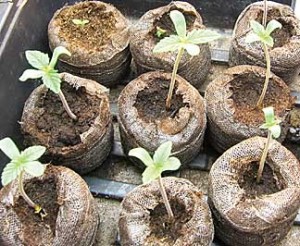
Planting flowers and vegetables each spring can be even more satisfying if you raise them from seed. Seeds cost less than live plants, and often you can find more varieties that way. You can also get a head start; home-sprouted seedlings can be ready for planting a few weeks before live plants are available for sale. We have a good selection of seeds in early March, and live veggie plants are at least a month away.
An important benefit of starting plants from seed is how much fun you and your family can have. Passing your love for plants along to a younger generation is very important, and the magic of sprouting seeds fascinates children. Veteran gardeners really enjoy this step; nothing warms the soul like the first tender sprouts in your windowsill garden!

Start seeds 4 to 6 weeks before you plant outdoors. Cool season crops like broccoli, cauliflower or lettuce can go into the garden before the last frost. Warm season crops like tomatoes and peppers should not be planted until all danger of frost is past. Seed packs all have timing information on them. You can time your seed planting by counting backwards from the date of last frost.
Fresh seeds are the most likely to sprout, but you can salvage seeds from last year if you allow for a lower percentage of germination. Moisture loss is the enemy; over-winter your leftover seeds in foil or airtight containers in the freezer.
Planting containers should be spotlessly clean, and have drain holes. The best containers are made of compressed peat, like “Jiffy Pots” and “Jiffy Pellets”. Porous containers wick moisture from below and drain well. Good mixes, like Espoma Organic Seed Starter, offer a lightweight, clean and sterile medium without insects, fungus or weeds. Moisten the mix with a little water (damp, not soggy). Soggy soil is your enemy; it can rot your seeds or encourage fungus diseases. Planting depth is very important. Follow the directions on the seed packet carefully. Cover the seeds with soil mix and tamp lightly so the seeds are held firmly in the soil.
Pouring, sprinkling or spraying water can pack down the soil too much, or knock tender seedling over. It’s better to water from the bottom. Set the container into a pan of shallow water for a short time (few seconds to a couple of minutes). Loosely cover with plastic wrap after watering to keep soil from drying out. As soon as the seeds germinate, remove the covering.
Soil temperature and day length are the “triggers” that make seeds sprout. For most seeds, sprouting requires soil temperature over 65°F and 12 to 16 hours of sunlight each day. Place your pots in a sunny location like a south-facing window. Heating from underneath using a heating pad is magic. Once the seeds sprout, turn the container a little each day, to prevent seedlings from leaning in one direction toward the light.
Wait to fertilize until seedlings have sprouted, to avoid burning tender roots! Just-sprouted seeds provide their own nourishment, but once leaves develop, it’s time for a little fertilizer. We prefer mild, balanced organic fertilizers like Espoma Plant Tone, which contain needed micronutrients and trace minerals. A weak solution of fish emulsion like Neptune’s Harvest works well also.
Before planting your seedlings outdoors, you should “harden them off” to get them used to cooler temperatures and breezes. Put them outside for a few hours each day, increasing their exposure to sunlight & wind, for about a week. Cut back on watering a bit, too. Your plants will become hardier and better prepared for transplanting.
When planting day arrives, slowly, gently remove plants from their containers without stripping the roots or tearing them. Plant them in fluffy, loosened soil mixed with a really good starter plant food like Espoma Garden Tone.
Steve Boehme is the owner of GoodSeed Nursery & Landscape, located on Old State Route 32 three miles west of Peebles. To e-mail your landscaping questions click “Contact Us” from their website at www.goodseedfarm.com or call (937) 587-7021.
